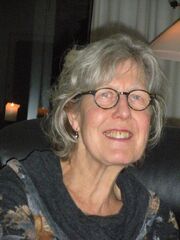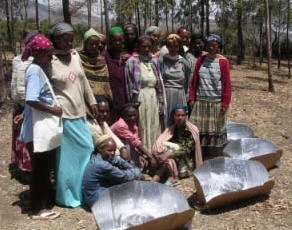Tom Sponheim (talk | contribs) No edit summary |
Tom Sponheim (talk | contribs) mNo edit summary |
||
| (17 intermediate revisions by 7 users not shown) | |||
| Line 1: | Line 1: | ||
| + | {{GoogleTranslateLinks}} |
||
| − | [[Image:Clara Thomas Granada 2006.jpg|left|200px]] |
||
| ⚫ | |||
| + | {{Updated|12|7|12}} |
||
| ⚫ | *'''November 2007:''' [[Solar Cooking Netherlands]] (SCN) has teamed up with [[Partnership for Integrated Sustainable Development Association]] (PISDA), a local non-governmental organization, to introduce solar cooking in four rural villages around Debre Zeit. PISDA has worked with female heads of households on a number of projects, such as tree planting, fuel-efficient wood stoves, and savings and credit associations. SCN’s [[Clara Thomas]], along with PISDA’s [[Ato Guillilat]], left early mornings on a two-wheeled horse wagon to visit the four rural villages. They first introduced solar cookers to village elders, and then spent a week training a group of solar cooking instructors. A year-long initial program was agreed upon to ensure continued follow up in the form of monthly collective solar cooking meetings to share experiences and advice. The project will likely expand next year. [[Image:Gende_Gorba_Ethiopia_2007.jpg|right]]A local solar fabricator in Addis Ababa — [[ |
||
| + | [[File:Clara_Thomas.jpg|thumb|Clara Thomas ]] |
||
| + | '''Clara Thomas''' started with her work on Solar Cooking in 2004. She is now chairman of [[Solar Cooking Foundation the Netherlands]] and advisor of Horn of Africa Regional Environmental Centre and Network ( [http://solarcooking.wikia.com/wiki/HOAREC/N HOAREC/N] ) since spring of 2011. Roughly twice a year she visits SCN projects in Uganda and Ethiopia. |
||
| ⚫ | |||
| − | ==Related links== |
||
| ⚫ | |||
| ⚫ | *'''November 2007:''' [[Solar Cooking Foundation the Netherlands]] (SCN) has teamed up with [[Partnership for Integrated Sustainable Development Association]] (PISDA), a local non-governmental organization, to introduce solar cooking in four rural villages around Debre Zeit. PISDA has worked with female heads of households on a number of projects, such as tree planting, fuel-efficient wood stoves, and savings and credit associations. SCN’s [[Clara Thomas]], along with PISDA’s [[Ato Guillilat]], left early mornings on a two-wheeled horse wagon to visit the four rural villages. They first introduced solar cookers to village elders, and then spent a week training a group of solar cooking instructors. A year-long initial program was agreed upon to ensure continued follow up in the form of monthly collective solar cooking meetings to share experiences and advice. The project will likely expand next year. [[Image:Gende_Gorba_Ethiopia_2007.jpg|right]]A local solar fabricator in Addis Ababa — [[Solar Bereket]] — will produce [[CooKit]] solar cookers by hand for the project. Towards the end of 2007 he will transfer his experience and knowledge to the women in rural areas so that they can make their own CooKits. ''[[Injera]]'', a pancake-like bread, is a local staple that cannot be cooked with simple solar cookers. (It requires a 60-centimeter diameter pan and baking temperature of at least 220°C.) A research program is underway to find a solar method for baking injera. The present cooking culture does not permit introducing collective solar injera baking through a large bakery or otherwise. In the meantime, injera will continue to be baked three times per week on a fuel-efficient wood stove. |
||
| ⚫ | |||
| ⚫ | |||
| ⚫ | |||
| + | ==Audio and video== |
||
| ⚫ | |||
| ⚫ | |||
| + | ==See also== |
||
| ⚫ | |||
| + | |||
| ⚫ | |||
| ⚫ | |||
| + | [[Solar Cooking Netherlands]]<br /> |
||
| + | Ganzenoordstraat 17<br /> |
||
| + | 1411 RG Naarden<br /> |
||
| + | [[Netherlands]] |
||
| ⚫ | |||
| − | [[Category:Who's who in the solar cooking movement|Thomas]][[Category:Eritrea|Thomas]][[Category:Netherlands|Thomas]] |
||
| + | [[Category:Individuals|Thomas]] |
||
| + | [[Category:Eritrea|Thomas]] |
||
| + | [[Category:Netherlands|Thomas]] |
||
| + | [[Category:Solar Cookers International Network members|Thomas]] |
||
Revision as of 01:21, 29 May 2014
|
Last edited: 7 December 2012
|

Clara Thomas
Clara Thomas started with her work on Solar Cooking in 2004. She is now chairman of Solar Cooking Foundation the Netherlands and advisor of Horn of Africa Regional Environmental Centre and Network ( HOAREC/N ) since spring of 2011. Roughly twice a year she visits SCN projects in Uganda and Ethiopia.
News and recent developments
- November 2007: Solar Cooking Foundation the Netherlands (SCN) has teamed up with Partnership for Integrated Sustainable Development Association (PISDA), a local non-governmental organization, to introduce solar cooking in four rural villages around Debre Zeit. PISDA has worked with female heads of households on a number of projects, such as tree planting, fuel-efficient wood stoves, and savings and credit associations. SCN’s Clara Thomas, along with PISDA’s Ato Guillilat, left early mornings on a two-wheeled horse wagon to visit the four rural villages. They first introduced solar cookers to village elders, and then spent a week training a group of solar cooking instructors. A year-long initial program was agreed upon to ensure continued follow up in the form of monthly collective solar cooking meetings to share experiences and advice. The project will likely expand next year. A local solar fabricator in Addis Ababa — Solar Bereket — will produce CooKit solar cookers by hand for the project. Towards the end of 2007 he will transfer his experience and knowledge to the women in rural areas so that they can make their own CooKits. Injera, a pancake-like bread, is a local staple that cannot be cooked with simple solar cookers. (It requires a 60-centimeter diameter pan and baking temperature of at least 220°C.) A research program is underway to find a solar method for baking injera. The present cooking culture does not permit introducing collective solar injera baking through a large bakery or otherwise. In the meantime, injera will continue to be baked three times per week on a fuel-efficient wood stove.
Audio and video
See also
Contact
Clara Thomas
Solar Cooking Netherlands
Ganzenoordstraat 17
1411 RG Naarden
Netherlands
Email: info@solarcooking.nl

